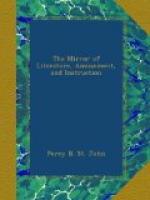Byron talked to-day of Leigh Hunt, regretted his ever having embarked in the “Liberal,” and said that it had drawn a nest of hornets on him, but expressed a very good opinion of the talents and principle of Mr. Hunt, though, as he said, “our tastes are so opposite, that we are totally unsuited to each other. He admires the Lakers, I abhor them; in short, we are more formed to be friends at a distance, than near.” I can perceive that he wishes Mr. Hunt and his family away. It appears to me that Byron is a person who, without reflection, would form engagements which, when condemned by his friends or advisers, he would gladly get out of without considering the means, or at least, without reflecting on the humiliation such a desertion must inflict on the persons he had associated with him. He gives me the idea of a man, who, feeling himself in such a dilemma, would become cold and ungracious to the parties with whom he so stood, before he had mental courage sufficient to abandon them. I may be wrong, but the whole of his manner of talking of Mr. Hunt gives me this impression, though he has not said what might be called an unkind word of him.
Much as Byron has braved public opinion it is evident he has a great deference for those who stand high in it, and that he is shy in attaching himself publicly to persons who have even, however undeservedly, fallen under its censure. His expressed contempt and defiance of the world, reminds me of the bravadoes of children, who, afraid of darkness, make a noise to give themselves courage to support what they dread. It is very evident that he is partial to aristocratic friends, he dwells with complacency on the advantages of rank and station, and has more than once boasted that people of family are always to be recognised by a certain air, and the smallness and delicacy of their hands.
* * * * *
NEW BOOKS.
THE PRIVATE CORRESPONDENCE OF A WOMAN OF FASHION.




